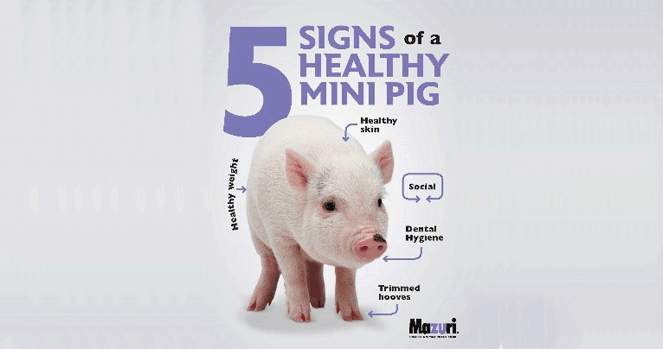5 Signs of Happy, Healthy Mini Pigs
Happy, healthy mini pigs are social, alert and show off their spunk. But, beyond those obvious signs of health, there are specific qualities to look for to know if your mini pig is healthy. Here are specific signs of mini pig health:
Healthy body weight
Mini pigs may weigh 70-150 pounds at maturity, but large variation exists within the variety of mini pigs. Using a tool to determine body condition score is a great way to ensure your pig is at a healthy weight for its size. Obesity is a problem that is all too common in mini pigs. Overweight mini pigs can develop problems such as arthritis, diabetes, and heart and liver disease. Even worse, obesity may affect a mini pig’s mental health causing them to become depressed or agitated. Obesity may become so severe that it causes poor vision and hearing loss. So, how do you keep a mini pig healthy? It starts with a well-balanced diet, weighing your little guy regularly and using a Body Condition Scoring chart developed for pigs to help guide your care of them. Use a complete feed targeted at the current life stage of your mini pig to help provide proper nutrition. If treats are offered, then provide in moderation. Mazuri offers three complete feed options, Youth, Active Adult and Mature Maintenance, each geared toward keeping mini pig weight and health on track.
Skin Condition
Skin condition may be another sign of healthy mini pigs, but skin is often overlooked and demands owner maintenance. A variety of conditions may contribute to dry skin in a mini pig including genetics, sun exposure causing sunburn, low humidity and diet. Many light-colored mini pigs are more susceptible to getting sunburn just like people and a result is dry, flaky skin. Where might a mini pig be exposed to low humidity levels? In your home! Climate-controlled space keep pets safe from outside threats, but they’re also notorious for low humidity levels – especially during the colder months. Other factors that could cause your mini pig’s skin to become dry include diet and parasites. Offering a complete feed provides mini pigs with necessary nutrients for good skin health. Also, monitor skin for mites or other parasites. If you see your mini pig itching uncontrollably, consult a veterinarian.
Trimmed hooves
Hoof health is essential to mini pig health. It’s important to take care of mini pig’s hooves, much like you take care of your fingernails and toenails. Hoof trimming should start at a young age to ensure that mini pigs are used to getting their hooves handled. Familiarize yourself with the hooves to ensure proper trimming. Although it varies from mini pig to mini pig, hoof trimming is needed about every six months. There are a few different tools you can use to trim a mini pig’s hooves. Options include an emery board, goat hoof trimmers or horse hoof nippers. If you are unsure how to trim your mini pig’s hooves or need assistance, discuss with your veterinarian.
Socialization
Mini pigs are not born as trusting or social animals due to their place in the wild as prey animals. Mini pigs may be nervous and will run away from loud noises or quick movements. Therefore, socialization is critical for mini pig health. Socializing starts when you first bring your mini pig home. Spend time with your mini pig and help them become comfortable with you. Simple things like getting on their level by laying on the floor with them, giving your pig time to get to know their surroundings and gently petting them while they sleep can help them become more social. The more time you spend with your mini pig, the more comfortable they will become with you.
Good dental hygiene
From tusks to needle teeth, the dental hygiene of a mini pig can be a challenge for many new mini pig owners. But, it’s important to maintain for mini pig health. Here are a few things you should know about mini pig teeth care:-
Brush your mini pig’s teeth using toothpaste without fluoride. Excessive fluoride is toxic to mini pigs.
-
Mini pigs are born with eight sharp, pointy needle teeth. They should be clipped by a veterinarian or breeder to protect you and others who may play with your mini pig. This is usually done early in a mini pig’s life before weaning.
-
Many mini pigs have tusks. Tusk trimming should only be done by a veterinarian.
Happy, healthy mini pigs make mini pig ownership a fulfilling experience. Check out more helpful information about mini pig ownership here: Two Mini Pig experts answer common questions about raising mini pigs.
.
